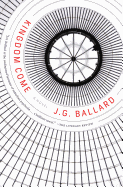
Kingdom Come is the second of two J.G. Ballard novels that had been unpublished in the U.S. during the author's lifetime. It's heavily grounded in the themes that dominated much of Ballard's fiction during the 1990s and 2000s--especially the dark side of that era's economic prosperity. Kingdom Come probes a thriving suburb nestled in the shadow of Heathrow, where a shopping mall anchors the community's gradual slide into a 21st-century fascism.
Richard Pearson arrives in Brooklands after his father is killed by a lone gunman in a mall shooting, only to learn that the primary suspect has been released based on the testimony of prominent eyewitnesses. Wondering if there's a conspiracy that's somehow related to the town's nationalistic undercurrent of racism, he decides to stick around and investigate.
Kingdom Come is less concerned with its story than with its themes; Pearson's vacillating personality sometimes seem to defy emotional logic for the sake of extending Ballard's opportunities to jab at high consumerism. That said, Kingdom Come works better as a story than Ballard's other fiction from this period and, in a way, the Metro Centre shopping mall of this final novel becomes a reworking of the eponymous luxury skyscraper in Ballard's classic High Rise (1975) pushed in an equally surreal and violent direction.
The Collins English Dictionary defines "Ballardian" as dealing with "dystopian modernity, bleak man-made landscapes and the psychological effects of technological, social or environmental developments." Kingdom Come is all that and then some--a fitting capstone to the Ballard legacy. --Ron Hogan, founder of Beatrice.com

